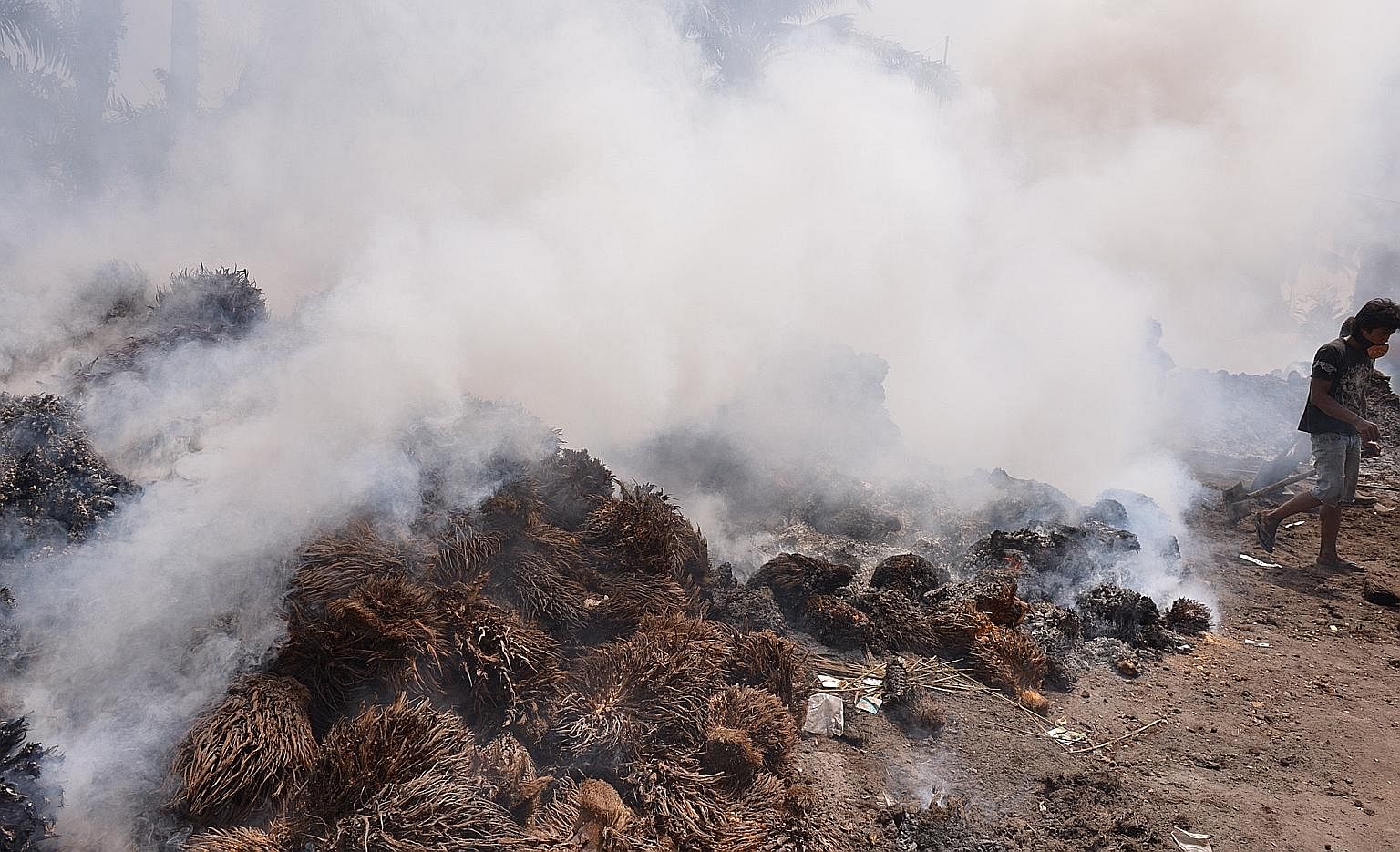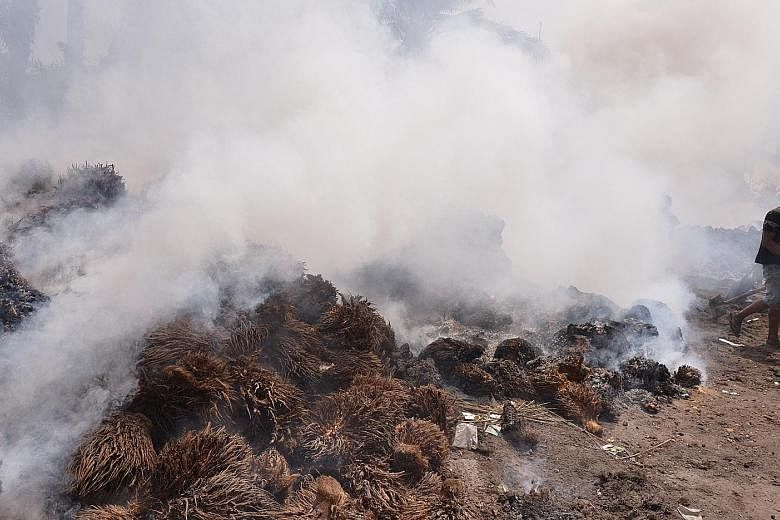The Indonesian government has stepped up its efforts to fight haze caused by deforestation, but is the private sector doing its part?
The government recently revoked or suspended the land-clearing licences of 27 companies linked to fires. President Joko Widodo announced a ban on new palm oil concessions and peat development, and the new peatland restoration agency (BGA) is putting an all-out effort into ensuring that the government's strong conservation policy is more than just good intentions.
However, the private sector companies that are directly responsible for burning and clearing are not doing all they can to support an Indonesian government that is newly focused on reducing deforestation.
Many of the rogue actors that have bedevilled past Indonesian efforts to protect the country's natural heritage are still up to their old games. That became clear when the companies that formed the Indonesia Palm Oil Pledge (IPOP), an entity set up by the leading palm oil companies and the Indonesia Chamber of Commerce, dissolved it at the beginning of July.
The organisation had been set up with the Indonesian government's backing after the top palm oil companies - Wilmar, Cargill, Golden Agri-Resources, Asian Agri, Musim Mas, and others - had all individually adopted their own strong conservation and human rights policies, and were seeking a government-backed platform through which they could advocate reform. But mid-level Indonesian government representatives tied to deforestation interests attacked the very companies doing the most to protect the region from haze, and the companies lacked the political spine to push back.
Notwithstanding the political drama, the demise of IPOP hasn't weakened companies' enforcement of their "No Deforestation" policies. Executives know that those policies are essential to maintaining access to their customers. It is getting harder and harder for companies to sell brands like Aquaphor or Nivea if the public finds out that the palm oil in their moisturiser, soap, or biscuits is linked to companies driving deforestation.

In the weeks since IPOP's news, for instance, more than two dozen major companies, including giants like Unilever, Bunge and Dunkin' Donuts, enforced their own "No Deforestation" policies by ceasing new purchases from the Malaysian palm oil giant IOI, which was repeatedly caught clearing forest and peatlands, and has been in conflict with indigenous communities.
Likewise, after the South Korean-Indonesian conglomerate Korindo was caught on camera conducting illegal open burning and deforestation, it could no longer sell to Wilmar, its biggest customer. Other companies are feeling the scrutiny as well, and facing tough consequences.
In other words, despite political posturing, trading giants are still individually insisting that products like paper, palm oil, and rubber must be free of deforestation.
But a systemic solution is still necessary: companies like Kornido, IOI, BLD Kirana, Indofood/Pepsico and others in some cases are still able to find markets for their goods. In the case of Korindo, clear law breaking still hasn't been punished.
This is bad news for the industry, and dangerous for everyone who has to breathe the air. As long as the big traders and governments tolerate deforestation by any company, every company will suffer the reputational consequences. Because of the actions of the rogue companies, international customers and investors are taking the understandable step of moving away from palm oil or Indonesian products entirely. As long as there is massive deforestation for palm oil and paper, consumers will have a hard time distinguishing good palm oil from bad.
THE BRAZILIAN EXAMPLE
There is a proven solution, and it's one that many of the companies active in the palm oil sector have already adopted in another part of the world. In the Brazilian Amazon, which has also suffered from deforestation, companies like ADM, Bunge, Cargill, Louis Dreyfus, and Wilmar created and adhere to the Brazilian soya moratorium, which bans deforestation by soya producers.
The companies jointly monitor deforestation across the Amazon. Any soya farmer found to be engaged in deforestation just loses market access. It's simple, tough, automatic, and transparent.
The results speak for themselves: within three years, deforestation for soya plummeted from 25 per cent of Brazilian Amazon deforestation to 0.25 per cent. The Brazilian cattle industry has also reduced deforestation through a similar mechanism. This progress has produced the world's biggest climate success story.
The economic side of Brazil's success should also interest the palm oil and paper industries: even as Brazilian soya growers have effectively eliminated deforestation, they have doubled production by planting on degraded lands instead of forests or indigenous territories.
I don't see why these companies should protect forests when it comes to soya production, but not palm oil or paper. The traders' South-east Asian operations should be racing to replicate the system, and regional governments should insist that they do so. It's the only way the private sector can end the cycle of burning, haze and damage to its commercial reputation that is jeopardising its access to international markets.
So how to stiffen companies' spines to get them to do at least as much in South-east Asia as they have been doing for a decade in Brazil? One of the most reliable ways to spur private sector action is by governments taking credible legal action. In the words of the great English writer Samuel Johnson, "When a man knows he is to be hanged in a fortnight, it concentrates the mind wonderfully".
Hangings shouldn't be required, but stern legal action is. Singapore recently passed the Transboundary Haze Pollution law, which permits palm oil and paper companies to be held legally responsible for their burning. It's past time to fully enforce it. The late Mr Lee Kuan Yew's aphorism, "If nobody is afraid of me, I'm meaningless", applies as much to stopping palm oil companies' crimes as it does to street crime.
Once a few of the worst palm oil companies are prosecuted, the rest will get the idea and set up their own mechanisms to police themselves. Let's just hope that governments and the industry don't wait for a repeat of the haze crisis before they act.
•The writer is Senior Fellow at the Centre for International Policy based in Washington, DC.

